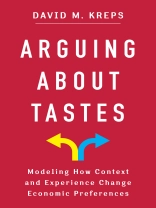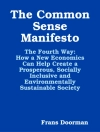Mainstream economics considers individual preferences to be fixed and unchanging. Although psychologists and other social scientists explore how tastes are formed, influenced, and evolve, it is not considered “proper” in orthodox economics to do so. Arguing About Tastes makes the case that economists should abandon the principle that preferences are fixed and instead incorporate into their work how context and experience shape individual tastes.
David M. Kreps argues that the discipline must account for dynamic personal tastes when it comes to understanding social exchange, emphasizing human resource management and on-the-job behavior. He develops formal models that illustrate the power of intrinsic motivation and show why applying extrinsic incentives can be counterproductive. Kreps weighs the advantages and disadvantages of the principle de gustibus non est disputandum: there is no arguing about tastes. He calls for a new era of economics in which preferences are taken into account—and not for granted.
Arguing About Tastes concludes with responses by the distinguished economists Alessandra Casella and Joseph E. Stiglitz and a final reply by Kreps.
Table des matières
Preface
Introduction: Gary Becker on Prenups
1. De Gustibus Non Est Disputandum: The Mainstream Economic Account of Individual Behavior
2. Intrinsic Motivation
3. Internalizing the Welfare of Specific Others
4. Two (or Three) Heterodox Books
5. Choice, Preference, And Utility in Dynamic Contexts
6. Some (Social) Psychology: Self-Perception and Attribution Theories
7. Intrinsic Motivation Undermined by Extrinsic Rewards?
8. Why Are “Social Promises” Unsecured?
9. The Quality of Kreps’s Performance Matters as Well
10. Intrinsic Motivation to Do What, Exactly?
11. Internalization of the Other Party’s Welfare
12. Dynamics Based on Bem’s Self-Perception Theory
13. Should Economists Move in These Directions?
Commentary, Joseph E. Stiglitz
Commentary, Alessandra Casella
Response to the Comments Of Professors Stiglitz and Casella
Appendix
Notes
References
Index
A propos de l’auteur
David M. Kreps is the Adams Distinguished Professor of Management and Economics Emeritus at Stanford University’s Graduate School of Business. He is a leading economic theorist whose contributions span areas including choice theory, financial markets, and game theory. Among his many books are Game Theory and Economic Modeling (1990), Microeconomics for Managers (second edition, 2019), and Microeconomic Foundations I and II (2012, 2023). Kreps has received honors including the John Bates Clark Medal, the John J. Carty Award for the Advancement of Science, the Erwin Plein Nemmers Prize in Economics, and the CME Group–MSRI Prize in Innovative Quantitative Applications.Alessandra Casella is professor of economics and political science at Columbia University, where she codirects the Institute for Social and Economic Research and Policy.Joseph E. Stiglitz is University Professor at Columbia University and a recipient of the Nobel Memorial Prize in Economic Sciences.












